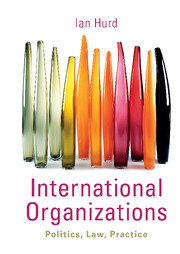Book contents
- Frontmatter
- Contents
- Preface
- Acknowledgement
- 1 Introduction to international organizations
- 2 A guide to the study of international organizations
- 3 The World Trade Organization
- 4 The International Monetary Fund and the World Bank
- 5 The United Nations I
- 6 The United Nations II
- 7 The International Labor Organization
- 8 The International Court of Justice
- 9 The International Criminal Court
- 10 Regional Organizations
- 11 Conclusion
- Index
11 - Conclusion
- Frontmatter
- Contents
- Preface
- Acknowledgement
- 1 Introduction to international organizations
- 2 A guide to the study of international organizations
- 3 The World Trade Organization
- 4 The International Monetary Fund and the World Bank
- 5 The United Nations I
- 6 The United Nations II
- 7 The International Labor Organization
- 8 The International Court of Justice
- 9 The International Criminal Court
- 10 Regional Organizations
- 11 Conclusion
- Index
Summary
The legal hierarchy between international organizations and their member states is interestingly unclear. The organizations are clearly the products of state decisions, but the particular legal commitments that states make to international organizations mean that states often find themselves legally subordinated to the rules of the organizations. And while international organizations have few coercive tools of enforcement, it is not costless for states to violate these rules. The costs to violation come in many currencies, both internal and external, both explicit and subtle; the power of an international organization may be either more or less than is revealed in its legal charter, and indeed it may be both more and less. To study the impact of international organizations in world politics today requires looking closely at individual cases and crises, rather than aiming for generalizations.
All international organizations face the same fundamental problem: how to influence their members to comply with the commitments they made upon joining the organization. These are institutions that exist by virtue of authority delegated to them by states and yet their purpose is to constrain or otherwise shape those same states. The success of an international organization can be judged by the metric of whether their members carry out their obligations, and it is generally considered a glaring failure when a member is blatant in its non-compliance.
- Type
- Chapter
- Information
- International OrganizationsPolitics, Law, Practice, pp. 267 - 274Publisher: Cambridge University PressPrint publication year: 2010



